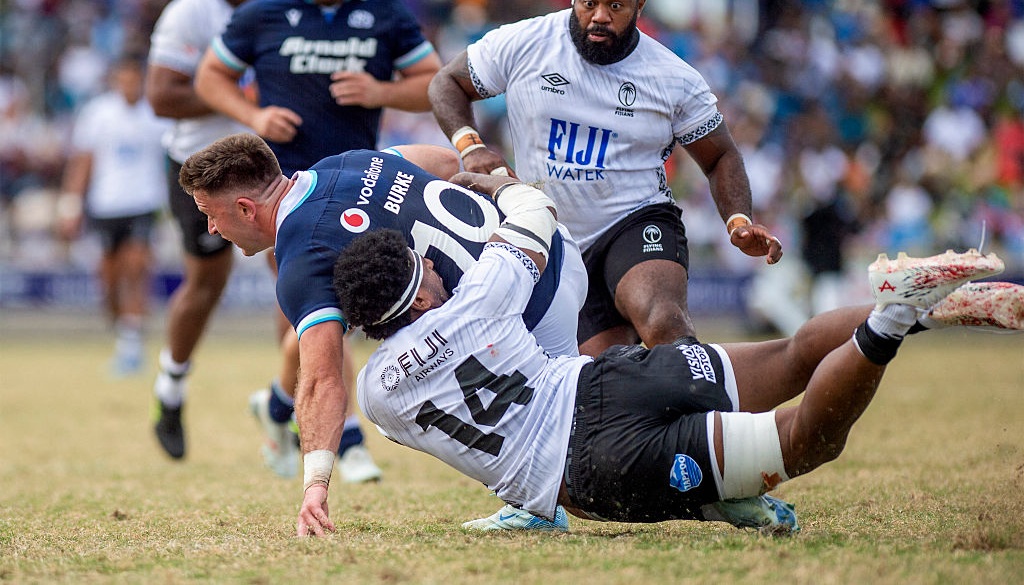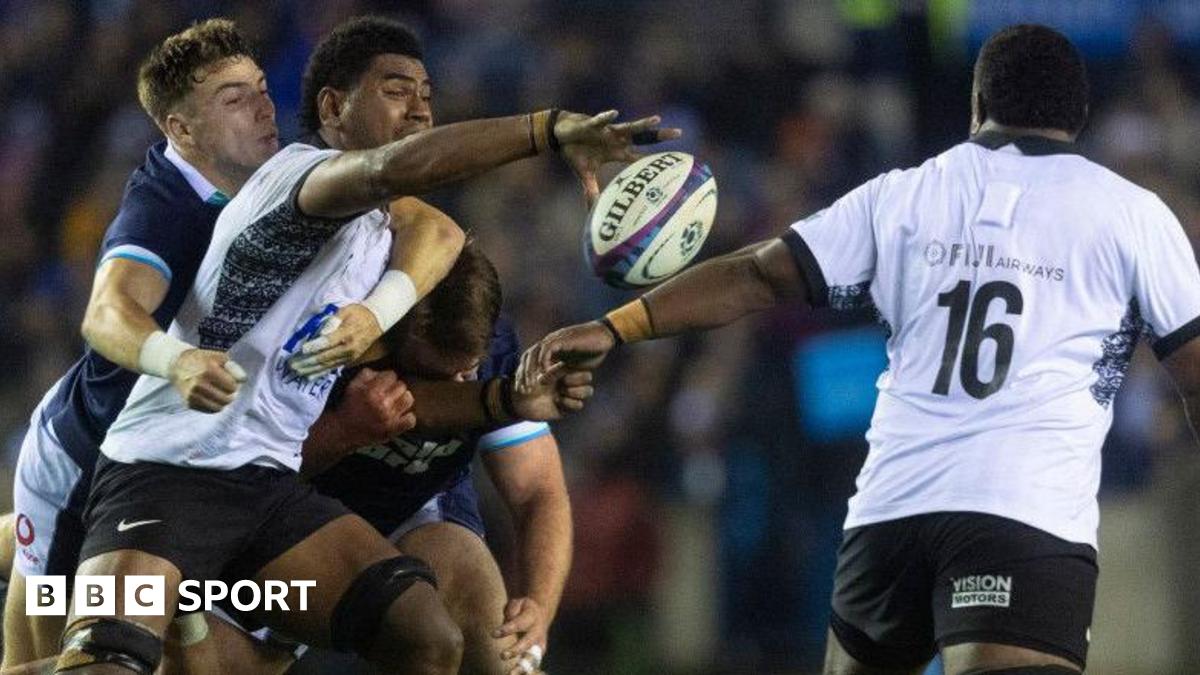Fiji’s rugby revolution reached new heights with a dominant 27-14 victory over sixth-ranked Scotland, sparking serious debate about their credentials as a top-10 rugby nation.
The Flying Fijians delivered their most complete performance in recent memory, combining trademark flair with newfound defensive discipline to overwhelm an experimental Scottish side reduced to 14 men. This statement win comes just months after Fiji’s controversial exclusion from British and Irish Lions selection.
With World Rugby’s ranking system ripe for disruption, Simon Raiwalui’s squad now has a genuine pathway to crack the elite tier – starting with their upcoming clash against Australia that could redefine Pacific rugby’s place in the global hierarchy.
- Fiji secured a historic 29-14 victory over Scotland, marking only their second official test win against the Scots and strengthening their case for inclusion in next year’s Nations Cup among rugby’s elite nations.
- Scotland’s ill-discipline proved costly, with star winger Darcy Graham receiving a red card, exacerbating the team’s struggles amid the absence of eight Lions-tour players.
- The result raises questions about Fiji’s potential rise into World Rugby’s top 10 rankings, while Scotland faces scrutiny over squad depth ahead of their Pacific tour finale against Samoa.
- The British and Irish Lions’ snub of Fijian players became a rallying point, fueling Fiji’s motivation against Scotland—a nation supplying eight Lions tourists.
- Fiji’s upcoming match against Australia presents a critical opportunity to prove their recent success wasn’t a fluke and solidify their standing in international rugby.
Fiji Rugby’s Historic Victory Over Scotland: A New Era Dawns
Fiji’s 29-14 demolition of Scotland marks a watershed moment for Pacific Island rugby. The Flying Fijians didn’t just win – they dominated a Tier 1 nation through structured play combined with their trademark flair. This victory represents only their second official test win against Scotland in five attempts, showcasing remarkable progress from their previous “boom or bust” playing style.

The match statistics reveal Fiji’s comprehensive dominance:
| Category | Fiji | Scotland |
|---|---|---|
| Possession | 58% | 42% |
| Territory | 62% | 38% |
| Defenders Beaten | 28 | 12 |
| Offloads | 14 | 5 |
Scotland’s discipline collapsed spectacularly with Darcy Graham’s red card and three yellow cards shown to their players. Fiji converted this advantage ruthlessly through set-piece efficiency and improved kicking from Ben Volavola. The Pacific Islanders are shedding their reputation as purely entertaining but inconsistent underdogs.

Tactical Breakdown: How Fiji Outclassed Scotland
The match revealed several strategic masterstrokes from Fiji’s coaching team:
- Targeted the breakdown – Physical loose forwards like Peceli Yato disrupted Scotland’s ruck speed
- Kicking variety – Clever grubbers exploited Scotland’s aggressive defensive line
- Midfield overloads – Created numerical advantages against Scotland’s rookie centers
Top 10 Ranking Within Reach? Fiji’s Path to Elite Status
Currently ranked 11th, Fiji’s victory over 6th-ranked Scotland could propel them into rugby’s top echelon. The World Rugby ranking system heavily rewards defeating higher-ranked opponents, making this result particularly valuable. Key upcoming fixtures that could cement their position:
- Australia (Sydney) – July 20
- New Zealand A (Auckland) – July 27
- Pacific Nations Cup – August series


The expanded player pool from Fiji’s European diaspora (now 32% of the squad) provides depth previously unavailable. Notable overseas-based stars include:
| Player | Club | Position |
|---|---|---|
| Levani Botia | La Rochelle | Flanker/Center |
| Waisea Nayacalevu | Toulon | Center |
| Villiame Mata | Edinburgh | No. 8 |



The Lions Snub Fallout: Motivation or Ongoing Inequality?
The British and Irish Lions’ exclusion of Fijian players despite their Premiership and Top 14 performances became a burning issue. Waisake Naholo’s viral criticism of selection policies clearly fueled Fiji’s motivation against Scotland – a nation supplying eight Lions tourists.
This controversy highlights deeper issues in rugby’s power structures:
- Financial disparities – Fiji’s union operates on 5% of Scotland’s budget
- Player eligibility battles – Pacific Island nations lose many stars to wealthier countries
- Scheduling inequality – Fiji averages 3 Tier 1 tests/year vs Scotland’s 11





Scotland’s Pacific Tour Nightmare: What Went Wrong?
Gregor Townsend’s experimental selections backfired spectacularly. Missing eight Lions tourists exposed alarming depth issues, particularly:
- Front row fragility – The scrum disintegrated against Fiji’s power
- Midfield vulnerability – Rookie centers were targeted mercilessly
- Breakdown chaos – Lost 5 turnovers to Fiji’s superior jackalers
The SRU must urgently address systemic problems in:
| Area | Required Fixes |
|---|---|
| Player Development | Better talent identification in border regions |
| Club-Federation Alignment | Ensure Glasgow/Edinburgh prioritize national needs |
| Grassroots Investment | Increase rugby participation in state schools |
Tournament Implications: Nations Cup Shakeup
Fiji’s victory strengthens their case for inclusion in next year’s elite Nations Cup tournament. Tournament organizers face mounting pressure to expand beyond traditional Six Nations/Rugby Championship teams. The arguments for Fiji’s inclusion:
- Entertainment value – Highest offload count in world rugby
- Competitive merit – 3 Tier 1 wins in last 5 matches
- Commercial potential – Growing global fanbase, especially in Pacific diaspora
Rugby’s New World Order: The Pacific Challenge
Fiji’s triumph continues a pattern of Tier 2 nations closing the gap through:
- Improved coaching – Former All Blacks/Springboks joining Pacific setups
- Rule changes – Eligibility adjustments helping retain dual-qualified stars
- Pathway programs – Local academies reducing reliance on NZ/Aus development


This shift demands responses from traditional powers:
| Nation | Required Adaptations |
|---|---|
| New Zealand | Stop treating Pacific Islands as feeder systems |
| Australia | Improve engagement with Polynesian communities |
| England | Leverage financial might to support global game |




Comments